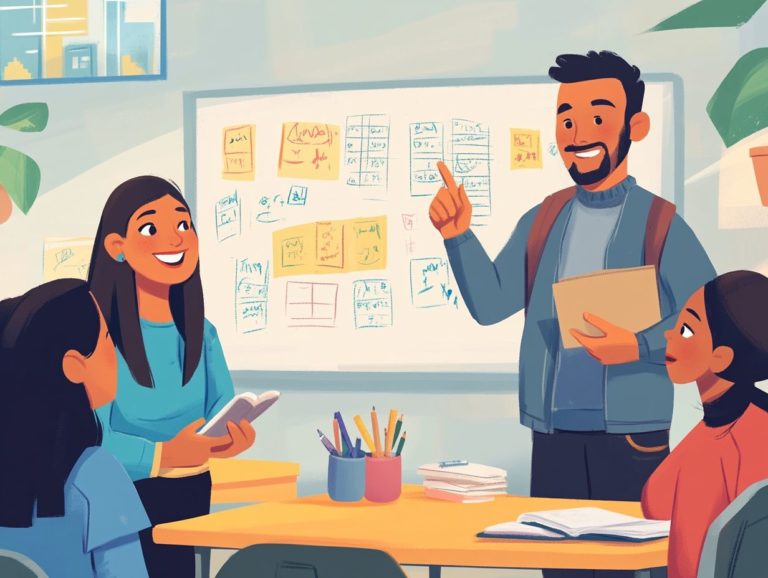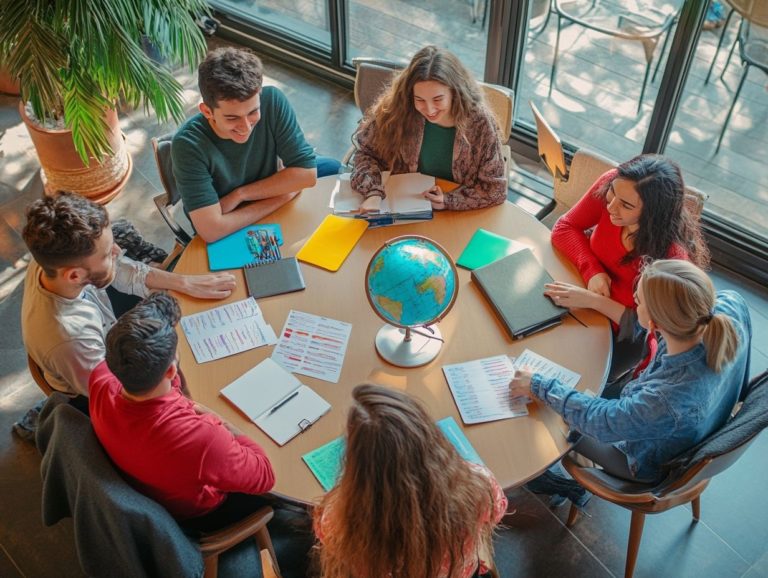How to Find Language Exchange Partners
Want to improve your language skills while diving into a new culture? A language exchange partner might just be the perfect solution for you.
This article explores the idea of a language exchange partner and the many benefits they offer on your language learning journey. From improving your conversational skills to enhancing your cultural insight, this guide will help you find partners both online and in your local community.
It also offers insights on effective communication and strategies to build a rewarding partnership. Get excited to take your language skills to the next level!
Contents
- Key Takeaways:
- Benefits of Finding a Language Exchange Partner
- Where to Find Language Exchange Partners
- How to Approach and Communicate with Potential Partners
- Making the Most of Your Language Exchange Partnership
- How to Create a Lasting Language Partnership
- Frequently Asked Questions
- 1. How can I find language exchange partners?
- 2. Is it necessary to be fluent in a language to find a language exchange partner?
- 3. How can I ensure my language exchange partner is reliable and committed?
- 4. Can I find language exchange partners for less popular languages?
- 5. Are there costs associated with finding a language exchange partner?
- 6. What should I expect from a language exchange partnership?
Key Takeaways:
- Language exchange partners boost your language skills and cultural insight.
- Online resources and local language exchange groups are excellent ways to find partners.
- Establishing clear communication and regularly practicing with your partner is key to a successful partnership.
What is a Language Exchange Partner?
A language exchange partner is someone who engages in a two-way language practice, allowing both of you to improve your speaking skills by conversing in each other’s native languages. This interactive learning process not only enhances cultural understanding but also significantly boosts your fluency while enriching your personal experiences as you set and achieve your language goals.
A successful partnership relies on effective communication and often revolves around shared interests, enabling both of you to exchange valuable cultural insights and experiences.
In this dynamic relationship, you and your partner become both teachers and learners, providing feedback and support to one another. This collaborative interaction speeds up your journey toward fluency and makes the learning experience enjoyable and engaging.
By creating a friendly space for open dialogue, you can explore various conversation topics and practice real-life scenarios essential elements for mastering everyday language use.
To build a solid foundation for effective communication, it s crucial to set clear goals and schedules, ensuring that you both stay aligned and committed to the exchange.
Benefits of Finding a Language Exchange Partner
Finding a language exchange partner opens up a world of benefits. It boosts your language learning through structured interactions, enhances your fluency, and enriches your cultural understanding.
By immersing yourself in a supportive environment where both partners contribute equally, you can develop your language skills more effectively while enjoying a rewarding sense of community engagement.
Improving Language Skills and Cultural Understanding
Improving your language skills and cultural understanding is at the core of successful language exchange partnerships. Here, both you and your partner practice speaking while using effective methods to communicate clearly. This collaborative approach utilizes various communication tools and language resources, fostering mutual learning and enhancing your overall proficiency.
To navigate the complexities of language improvement, it’s essential to explore diverse strategies. Consider using multimedia resources like podcasts, films, and interactive apps in your routine. By using language exchange platforms, you can connect with native speakers who can assist with vocabulary and grammar while sharing valuable cultural nuances and context.
Participating in local language meetups or online forums can significantly enrich your learning experience. Such interactions allow you to appreciate the subtleties of tone and expression, leading to a deeper connection with the language and its cultural background. Encouraging feedback during these exchanges is also vital; it sharpens your skills and makes the entire process more enjoyable.
Where to Find Language Exchange Partners
You can discover language exchange partners through various effective channels, such as specialized online platforms and local groups that promote community interaction.
Well-known websites like Italki, Tandem, and HelloTalk provide user-friendly interfaces, making it easy for you to connect with native speakers and fellow learners who share your language goals.
Start your language exchange journey today connect with someone who shares your passion for learning!
Online Resources
Online resources are important for finding language exchange partners. They provide platforms that facilitate partner matching and effective communication.
Websites like Italki, Tandem, and HelloTalk equip you with invaluable tools to connect with native speakers. You can set aside dedicated time for language practice and enhance your skills through structured exchanges.
These platforms also feature user-friendly interfaces that make it easy to search for compatible partners based on your language preferences, learning goals, and availability.
With options like text and voice messaging, video calls, and interactive exercises, your experience is enriched, allowing seamless conversations and real-time feedback.
By incorporating community forums and language quizzes, these resources help deepen your understanding and retention of the language. With intuitive navigation, learners at any level find these applications accessible and engaging. This transforms the journey toward fluency into a genuinely enjoyable experience.
Local Language Exchange Groups
Local language exchange groups offer an exceptional opportunity to engage socially and enhance your language skills within a welcoming community atmosphere. These groups typically meet regularly, allowing you the perfect chance to practice speaking and collaborate with others who share your language aspirations.
By immersing yourself in these gatherings, you elevate your conversational abilities and gain valuable insights into cultural nuances that enrich the language you are learning.
This community engagement creates a supportive environment, enabling you to navigate language barriers with ease.
As members share experiences and traditions, a vibrant tapestry of cultural exchange emerges, deepening your understanding and appreciation for one another s backgrounds. Ultimately, this blend of in-person practice and social interaction builds stronger linguistic foundations, making your learning journey effective and enjoyable.
How to Approach and Communicate with Potential Partners
When you approach potential language exchange partners, it s essential to take a strategic stance that highlights effective communication and a well-defined conversation structure.
Implementing best practices will help you initiate meaningful interactions and cultivate productive partnerships that align with your language goals.
Best Practices for Making Connections
Employing best practices for connecting with conversation partners can significantly improve your language exchange experience. Approaching potential partners with a clear understanding of each other’s learning preferences and goals establishes a solid foundation for a fruitful partnership.
Start by actively listening to your partners and showing genuine respect for their viewpoints. Ask open-ended questions that encourage deeper dialogue.
Establishing mutual goals ensures both parties are aligned in their objectives and helps maintain motivation throughout the exchange.
Creating a supportive environment is crucial; it enables partners to share their challenges and successes freely, enhancing both learning and camaraderie.
Building rapport through shared interests can further facilitate connections, transforming the entire language exchange journey into an experience that is both educational and enjoyable.
Making the Most of Your Language Exchange Partnership
To truly maximize the benefits of your language exchange partnership, implement effective strategies that foster continuous learning and improvement in your language practice.
By selecting engaging session topics and embracing diverse learning methods, you and your partner can elevate your language skills while genuinely enjoying the journey together.
Fun Ways to Practice Language Skills
Implementing effective strategies and engaging activities can elevate the quality of your language practice during exchanges. By using set conversation topics, like topic-focused discussions and role-playing scenarios, you create meaningful contexts for practicing the language.
Incorporating creative activities, such as storytelling and improvisational games, encourages spontaneous language use, allowing for a more natural flow of conversation. A mix of formal and informal dialogue sharpens your vocabulary and enhances your fluency across various situations.
Encouraging feedback during these exchanges boosts your confidence and pinpoints areas for improvement. Using videos and apps adds an extra layer of engagement and provides diverse contexts for practice, ensuring that you adapt your skills effectively.
Ultimately, these methods highlight the importance of a balanced approach, transforming your language learning experience into something both enjoyable and productive. Start practicing today!
How to Create a Lasting Language Partnership
Establishing a long-term language exchange partnership requires intentional efforts to foster open communication and track your progress toward fluency.
By setting regular goals and committing to continuous improvement, you will create a sustainable partnership that benefits both of you over time.
Keep the Conversation Going: Track Your Progress!
Maintaining communication and tracking progress are vital elements in establishing a successful language exchange partnership, especially for achieving your language fluency goals. Regular feedback, along with a supportive environment, nurtures motivation and accountability, enriching your overall learning experience.
You can achieve this through effective methods, such as setting clear milestones and using tools like shared journals or digital platforms to document improvements. Consistent, constructive feedback is crucial, helping you recognize both your strengths and areas for growth.
Adopting practices like regular check-ins can significantly enhance the dialogue about progress, ensuring that both you and your partner remain aligned in your objectives.
By fostering an environment where open communication flourishes, you can navigate challenges effectively and celebrate successes together, bringing both partners closer to their desired fluency.
Frequently Asked Questions
1. How can I find language exchange partners?
There are several ways to find language exchange partners. One option is to join online language exchange communities, such as Interpals or ConversationExchange, where you can connect with native speakers who want to learn your language. You can also attend language exchange events in your area or use language learning apps like HelloTalk.
2. Is it necessary to be fluent in a language to find a language exchange partner?
No, you do not need to be fluent in a language to find a partner. Many people seek practice partners at all proficiency levels. As long as you are willing to learn and practice, you can find a suitable language exchange partner.
3. How can I ensure my language exchange partner is reliable and committed?
Before starting, communicate openly with your partner and set expectations. Ask for references or recommendations from other language learners, and check their availability. Starting with a trial session can also help determine if you re a good match.
4. Can I find language exchange partners for less popular languages?
No, you can find partners for any language you are interested in learning. Many online communities and apps cater to less commonly taught languages. Joining groups or forums dedicated to specific languages can help you connect with potential partners.
5. Are there costs associated with finding a language exchange partner?
Most online language exchange communities and apps are free to use. Some may offer premium features for a fee. In-person language exchange events might also charge a small fee to cover expenses. Overall, finding a language exchange partner is a cost-effective way to improve your skills.
Ready to start your language journey? Connect with a partner today!
6. What should I expect from a language exchange partnership?
Join forces to improve your language skills! A language exchange partnership is a chance for both people to learn from each other.
Clear communication is essential. Respect each other’s time and effort to make the most of the partnership.
Organizing your practice can help. Set language goals and practice specific topics or skills together.






